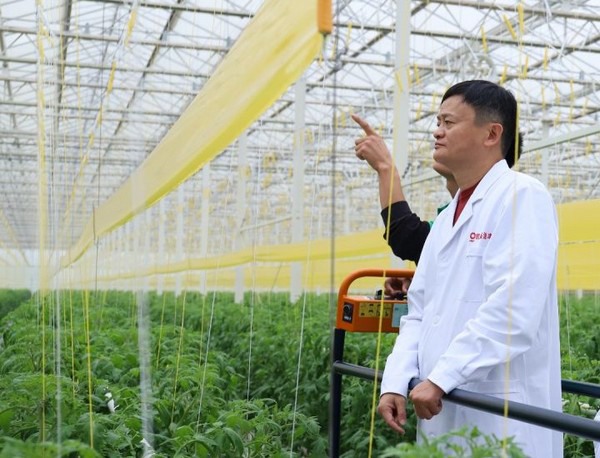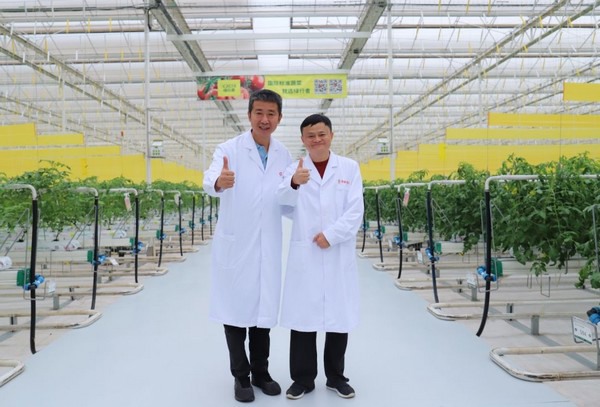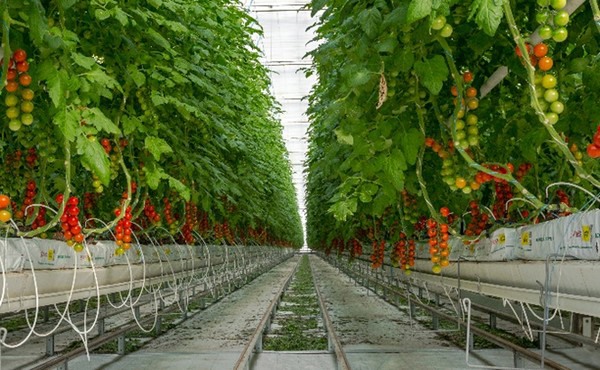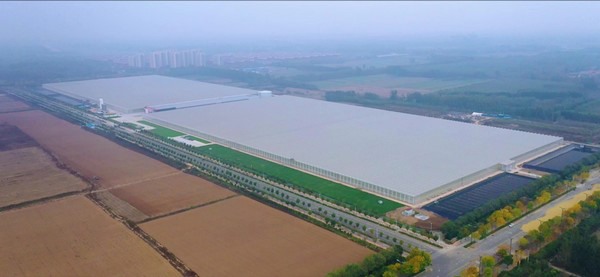Mr. Jack Ma, the founder and former CEO of Alibaba Group, visited the largest AI greenhouse in Asia on the 10th of October. He personally carried out the inspection of Kaisheng Haofeng (Dezhou) AI Agriculture Co., Ltd. in Dezhou, Shandong.

Mr. Jack Ma visits the production service area at Kaisheng Haofeng
Mr. Jack Ma visited Kaisheng Haofeng to inspect progress
Mr. Ma Tiemin, board member of Kaisheng Haofeng (Dezhou) AI Agriculture, joined Hupan University, which was founded by Mr. Jack Ma. Mr. Ma Tiemin wrote his dissertation on "installation agriculture in China" and received the attention and interest of Mr. Jack Ma and other teachers at the university. After Mr. Ma Tiemin defended his dissertation, he was further drawn into an intense discussion of Chinese installation agriculture with Mr. Jack Ma, and they made an appointment for Mr. Jack Ma to visit the greenhouse in Dezhou. Mr. Jack Ma was joined by the CEO of Sunac, the founder of YF Capital, the CEO of Alibaba Health, the director of Alibaba Cloud AI, the vice-chairman of Alibaba Group, and the deputy secretary of the Alibaba Group Party Committee. They were met by specialists from various fields. All could see the importance Alibaba attaches to installation agriculture and the development potential of this industry.
Mr. Jack Ma paid particular attention to the production service area and the AI greenhouse. He listened to relevant specialists explain the automated selection line for tomatoes, spectrum analysis of tomatoes, coconut coir, drip irrigation, and liquid fertilizer. He also paid careful attention to the details of the automated packaging line, fixed plantation of tomatoes in AI greenhouses and their growing conditions. After the visit came to an end, Mr. Jack Ma held a news conference to share his experience: "Chinese installation agriculture as an industry is in a similar stage as the internet was in 2002. There are developments that turn the industry upside down. There is enormous potential for growth in this industry, but only if the industry pays attention to skill and technology." Mr. Jack Ma also expressed hope to explore various possibilities in the industry together with Kaisheng Haofeng, and promote innovation in the agricultural industry and in Chinese society as a whole.

Kaisheng Haofeng CEO Mr. Ma Tiemin (left) and Alibaba founder Mr. Jack Ma (right)
Agricultural production is not focused on business, but on production
Mr. Ma Tiemin shared some of his insights in the problems of China's installation agriculture, which he learned from years of experience in the industry:
First, although many companies import innovative equipment and technology from abroad, most of the agricultural installations are either for show or for research. Not many innovative installations are oriented towards products. There have been significant changes in the industry, but there is still a long way to go when it comes to data-driven production.
Second, Chinese companies do not integrate well with overseas suppliers. Some suppliers are completely focused on commercialization and not willing to help their clients optimize production. In addition, some Chinese companies blindly select overseas suppliers. They only pay attention to innovative technology and do not consider the type of greenhouse or the characteristics of specific installations. They construct greenhouses in unsuitable locations and do not adjust to specific environmental characteristics. That is why the production volume does not meet the expectations. This is a common problem in Chinese installation agriculture. Agricultural production should be about the smallest investment for the largest production volume while guaranteeing stable production.
Third, in Kaisheng Haofeng, before the purchase of new equipment was considered, the supplier invited several Dutch farmers to give company employees an introduction to the equipment and train them in its use. However, there is still not enough attention to science and data during the production process. Mr. Ma Tiemin hopes that in the future company employees can benefit from the experience of foreign farmers with data-driven production, and share this knowledge with local farmers.
Fourth, another problem in the Chinese agricultural industry is the division between urban and rural. The agricultural installations in cities are advanced, and the same goes for personnel allocation and management experience, but the situation in rural production areas still lags behind. Most of the young people with advanced knowledge of technology end up in high-end greenhouses and they are not eager to support farmers in the fields. That is why the division between urban greenhouses and rural production areas continues to grow wider. According to Mr. Ma Tiemin, the best approach is to implement experimental and established technologies under controllable conditions in rural production areas to improve the production volume and so spread the advantages of high-tech agriculture to even more consumers.

Tomato plants at Kaisheng Haofeng
The goal is to optimize agricultural production
"China is huge and varied, and stretches across numerous climate zones. Many regions are unsuitable for agricultural production. However, greenhouse technology can provide a degree of control over production parameters and create a micro-climate. That is why greenhouse technology is an excellent solution in regions unsuitable for agricultural production. However, we should not focus all our attention on greenhouse technology. Open field agriculture deserves equal attention. As Mr. Jack Ma emphasized during the press conference, the development of China's agriculture requires data-driven solutions. And this data-driven approach does not just apply to production, but can also perform a valuable function in the supply chain," said Mr. Ma Tiemin.
"We at Kaisheng Haofeng hope to develop a 'model for data-driven agriculture' and share with agricultural cooperations the kind of data-driven, automated technology that we have tested and verified in our greenhouses. We also hope to connect them with online retail markets to integrate and standardize the entire supply chain from plantation and harvest to packaging and distribution, all the way to the table of the consumer. Our AI system can help consumers track and trace their products during every step of the supply chain," said Mr. Ma Tiemin. "We also hope to work closely together with similar-minded colleagues in the industry and discuss production with optimization in mind."

The largest greenhouse in Asia, managed by Kaisheng Haofeng
The largest greenhouse in Asia is managed by Kaisheng Haofeng. This project involved the most advanced international vegetable production installations (AI greenhouse), plantation management techniques imported from abroad, and connective IoT technology. The greenhouse applies data-driven production and retail models. And all production methods meet the Global GAP standards. Top-quality vegetables are produced in large volumes under optimum conditions. Their product quality is rigorously controlled with advanced technology to guarantee high efficiency and food safety. The greenhouse has a huge production volume, a long lifespan, a stable micro-climate, low waste levels, and optimum soil usage. The automated equipment can grow vegetables in coconot coir with liquid fertilizer under climate-controlled conditions. These are the most advanced vegetable production conditions in the world. Science-driven technology allows the greenhouse to completely recover all rain water and CO2. The Kaisheng Haofeng AI greenhouse produces 5-6 times more tomatoes than other greenhouses of similar size or open-field farms, and only uses 5% of their irrigation water. This is the most efficient way to produce tomatoes.
For more information:
Ma Tiejun - CEO
Kaisheng Haofeng (Dezhou) AI Agriculture Co., Ltd.
Tel.: +86 18053232777
E-mail: [email protected]
